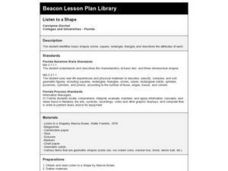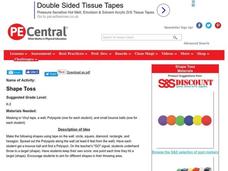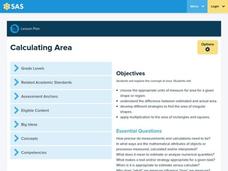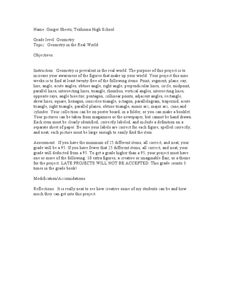Curated OER
The Chicken Run
Fourth graders work in a group of 4 to make rectangle with a 12m length of string. They discuss its perimeter and how they would calculate its area. Then another group of 4 make another rectangle and estimate if the area would be greater...
Curated OER
Rings and Diamonds
Fifth graders solve a problem by using systematic problem solving strategies. They determine if there is enough information to solve the problem. They solve a problem involving geometric shapes and area.
Curated OER
Measurement: Lesson 2
Eighth graders complete math problems given in this lesson, where they find the perimeter and area of specific figures. They estimate the perimeter and area of shapes and figures and then complete the mathematical formula to find the...
Curated OER
Count the Squares and Compare
Fourth graders construct squares and rectanges in order to help them find areas and perimeters. They gain an understanding of area and perimeter through teacher modeling and then they construct squares and rectangles.
Curated OER
Perimeter Play
Fifth graders identify that the perimeter of a shape is the sum of its sides.
Students cut some string or rope to make the sides of a rectangle. Students write the measurement of the length of the rectangle and the measurement of the...
Curated OER
Listen to a Shape
First graders identify basic shapes (circle, square, rectangle, triangle) and describes the attributes of each. They use magazines to find examples of each shape, and then make a collage.
Curated OER
Shape Toss
Young scholars get a bounce ball and find a Polyspot. On the teacher's signal, students underhand throw to a target. They keep their own score: one point each time they hit a target.
Virginia Department of Education
Order Up!
Order in the math class! Scholars learn to evaluate expressions using the order of operations. A game has them rolling number cubes to determine numbers to use when evaluating.
EngageNY
Multiplying Polynomials
There's only one way to multiply, right? Not when it comes to polynomials. Reach each individual by incorporating various representations to multiplying polynomials. This lesson approaches multiplying polynomials from all angles. Build...
Pennsylvania Department of Education
Multiplication Using Arrays
Explore the concept of multiplication by using arrays. Classmates use arrays to gain a better understanding of multiplication. They break arrays apart to model the distributive property of multiplication over addition. The relationship...
Curated OER
Which container holds a larger amount of popcorn?
What does popcorn have to do with math? Seventh grade mathematicians are provided an opportunity to develop a conceptual understanding of the formula for volume and to use it as a tool to solve problems. The lesson begins with a...
Curated OER
Expected Outcome
Young scholars determine expected values of experiments and explore distributions of experiments. They guess as to how many times a coin will flip heads in fifty tries. They flip a coin fifty times graphing the results on a histogram....
Pennsylvania Department of Education
Making Cubes
Third graders explore vocabulary associated with three dimensional figures. In this transformations lesson, 3rd graders create two dimensional nets for three dimensional figures. Students become familiar with describing two...
Pennsylvania Department of Education
Length and Perimeter
Third graders explore tessellations and the spatial concepts used in creating them. In this tessellations lesson plan, 3rd graders rotate, reflect and transform shapes to create tessellations. Students become familiar with...
Pennsylvania Department of Education
A Geometric Scavenger Hunt
Fifth graders connect their knowledge of polygons and polyhedrons. In this geometric shapes instructional activity, 5th graders identify and classify two- and three-dimensional objects. Students construct a polyhedron out of polygons and...
Curated OER
Manipulating Integers
In this algebra worksheet, students manipulate integers to add, subtract, multiply and divide using order of operation. They rewrite word problems and solve for the unknown. There are 24 questions with an answer key.
Curated OER
Proving the Pythagorean Theorem
Young scholars solve problems using the pythagorean Theorem. In this geometry lesson, students complete proofs using the Pythagorean Theorem. They share their proofs and solutions with their classmates and family members.
Curated OER
Geometry in the Real World
Eighth graders complete a unit of lessons on basic geometry concepts. They participate in a variety of activities, culminating in a project that involves publishing a booklet or a poster that presents the major geometry concepts from the...
Curated OER
Multiplying Polynomials
Students explore the concept of multiplying polynomials. In this multiplying polynomials lesson, students watch a video clip about basic math skills. Students work in groups on an exploration about why a binomial squared equals a perfect...
Curated OER
What a Square
Students examine the painting "Old Man With A Gold Chain" by Rembrandt. They identify geometric shapes in the painting, measure these shapes and compare the relationships of these measurements.
West Contra Costa Unified School District
Solving and Using Literal Equations
You literally need to use the resource. Young mathematicians solve geometric problems by using literal equations. They go on to solve distance/rate/time problems by using literal equations — a great progression that helps introduce the...
Illustrative Mathematics
Shape Hunt Part 2
Shapes are everywhere in the world around us, from rectangular doors to the circular wheels of a car. The second lesson in this series opens the eyes of young mathematicians to this wonderful world of shapes as they search the classroom,...
Curated OER
Solving Applications Using Quadratic Equations
In this solving applications worksheet, learners translate word problems to number sentences. They solve the created quadratic equation. This three-page worksheet contains 12 problems.
Curated OER
Pythagorean Theorem by Graphic Manipulation
There are many different ways to show a proof of the Pythagorean Theorem. Here is a nice hands-on paper cutting activity that shows a graphic representation. You can even challenge your young Pythagoreans to come up with their own...























